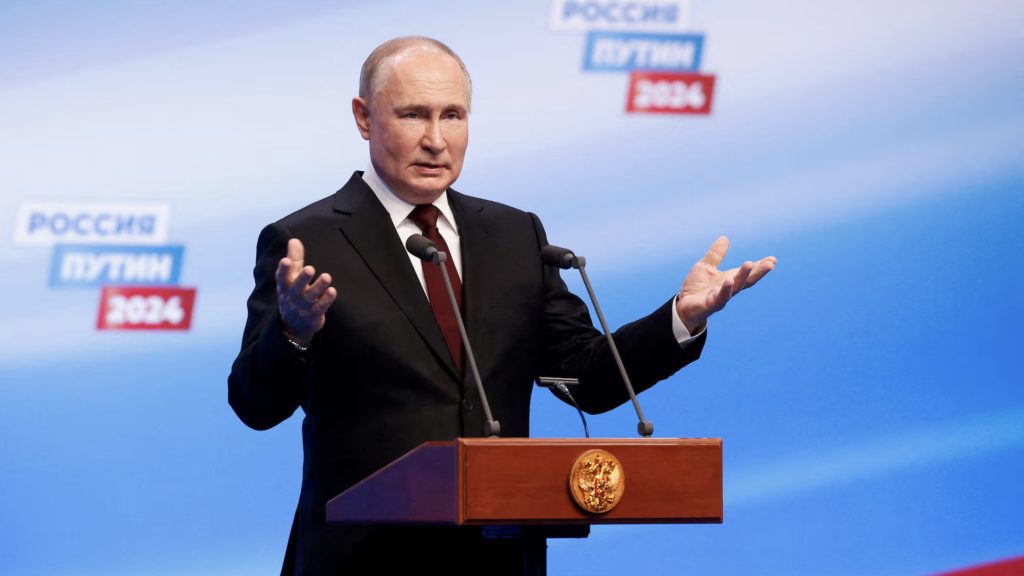MOSCOW, March 17 (Reuters) – President Vladimir Putin achieved a huge victory in Russia’s election on Sunday, solidifying his already strong control over power in a win he said demonstrated Moscow's strength in opposing the West and sending its troops into Ukraine.
Putin, a former KGB lieutenant colonel who first came to power in 1999, made it clear that the result should send a message to the West that its leaders will have to deal with a more confident Russia, whether in war or peace, for many more years to come.
The result means Putin, 71, is set to start a new six-year term that will make him Russia’s longest-serving leader for more than 200 years if he completes it, surpassing Josef Stalin.
Putin got 87.8% of the vote, the highest ever result in Russia’s post-Soviet history, according to an exit poll by pollster the Public Opinion Foundation (FOM). The Russian Public Opinion Research Centre (VCIOM) put Putin on 87%. First official results indicated the polls were accurate. The United States, Germany, the United Kingdom, and other nations have said the vote was neither free nor fair due to the imprisonment of political opponents and censorship.
Communist candidate Nikolai Kharitonov finished second with just under 4%, newcomer Vladislav Davankov third, and ultra-nationalist Leonid Slutsky fourth, partial results suggested.
Putin told supporters in a victory speech in Moscow that he would prioritize resolving tasks associated with what he called Russia’s “special military operation” in Ukraine and would strengthen the Russian military.
“We have many tasks ahead. But when we are consolidated – no matter who wants to intimidate us, suppress us – nobody has ever succeeded in history, they have not succeeded now, and they will not succeed ever in the future,” said Putin.
Supporters chanted “Putin, Putin, Putin” when he appeared on stage and “Russia, Russia, Russia” after he had delivered his acceptance speech.
Inspired by opposition leader Alexei Navalny, who died in an Arctic prison last month, thousands of opponents protested at noon against Putin at polling stations inside Russia and abroad.
Putin told reporters he regarded Russia’s election as democratic and said the Navalny-inspired protest against him had had no effect on the election’s outcome.
In his first comments on his death, he also said that Navalny’s passing had been a “sad event” and confirmed that he had been ready to do a prisoner swap involving the opposition politician.
When asked by a NBC, a U.S. TV network, whether his re-election was democratic, Putin criticized the U.S. political and judicial systems.
“The whole world is laughing at what is happening (in the United States),” he said. “This is just a disaster, not a democracy.”
“…Is it democratic to use administrative resources to attack one of the candidates for the presidency of the United States, using the judiciary among other things?” he asked, making an apparent reference to four criminal cases against Republican candidate Donald Trump.
The Russian election occurs just over two years since Putin caused the deadliest European conflict since World War Two by ordering the invasion of Ukraine.
War has been present throughout the three-day election: Ukraine has repeatedly attacked oil refineries in Russia, shelled Russian regions, and tried to breach Russian borders with proxy forces – a move Putin said would not go unpunished.
Putin mentioned that Russia might have to establish a buffer zone inside Ukraine to prevent such attacks in the future.
While Putin’s re-election was not in question due to his control over Russia and the absence of any real challengers, the former KGB spy had wanted to demonstrate that he had the overwhelming support of Russians.
The nationwide turnout was 74.22% at 1800 GMT when polls closed, election officials reported, surpassing 2018 levels of 67.5%.
There was no independent count of how many of Russia’s 114 million voters participated in the opposition demonstrations, amidst stringent security involving tens of thousands of police and security officials.
Reuters reporters noticed an increase in the number of voters, particularly younger individuals, at midday at polling stations in Moscow, St Petersburg, and Yekaterinburg, with lines of several hundred people and even thousands.
Some stated that they were protesting, although there were few obvious signs to set them apart from regular voters.
At least 74 individuals were arrested on Sunday across Russia, as per OVD-Info, a group that monitors crackdowns on dissent.
Over the previous two days, there were isolated incidents of protest as some Russians set fire to voting booths or poured green dye into ballot boxes. Opponents shared some pictures of ballots spoiled with insults against Putin.
But Navalny’s death has left the opposition without its most formidable leader, and other major opposition figures are abroad, in jail, or deceased.
The West portrays Putin as an autocrat and a murderer. Ukrainian President Volodymyr Zelenskiy stated on Sunday that Putin aimed to rule indefinitely and that the vote had been unlawful.
Putin depicts the war as part of a centuries-old conflict with a declining West that he says denigrated Russia after the Cold War by encroaching on Moscow’s sphere of influence.
Russia’s election comes at what Western intelligence chiefs assert is a critical juncture for the Ukraine war and the broader West.
Support for Ukraine is complicated by U.S. domestic politics leading up to the November presidential election.
Though Kyiv regained territory after the 2022 invasion, Russian forces have made progress following a failed Ukrainian counter-offensive last year.









